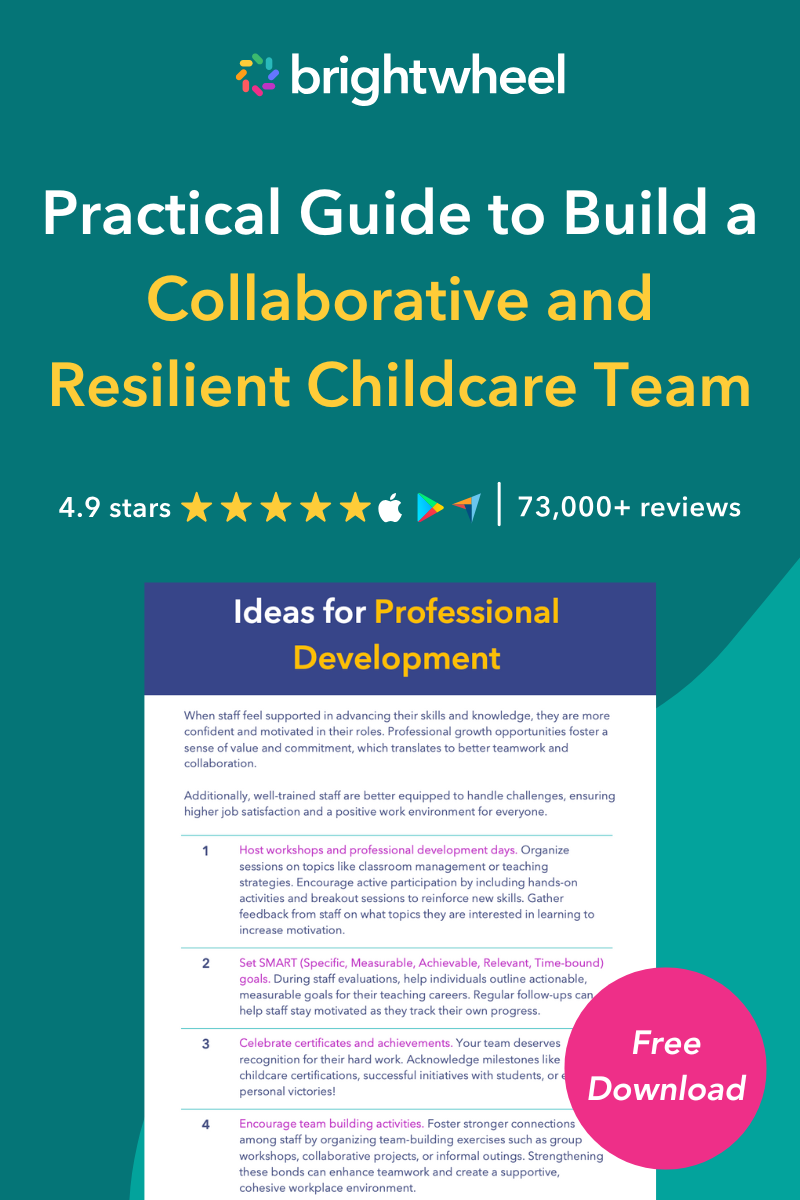Building a strong team is essential for any successful childcare program. While you likely focus on standard manager-employee relationships, incorporating coaching and mentoring in early childhood settings can take your staff's performance to the next level.
Implementing these professional development strategies helps boost morale, increase engagement, and create high-performing educators. This guide explores the differences between coaching and mentoring, their benefits, and how you can effectively use both to support your team.
What are coaching and mentoring?
While often used interchangeably, coaching and mentoring are distinct approaches to staff development.
Coaching is a performance-driven process. It involves training an individual or group to develop specific skills to achieve short-term goals. It is typically structured, with regular meetings (weekly or monthly) aimed at improving current job performance.
Mentoring is a development-driven relationship. It focuses on long-term personal and professional growth. A mentor shares knowledge and experience to guide an employee's career trajectory. These sessions are often more informal and occur as needed.
Key differences at a glance
- Focus: Coaching targets specific performance goals; mentoring targets long-term career development.
- Timeframe: Coaching is often short-term (until a goal is met); mentoring is long-term (often 1+ years).
- Structure: Coaching is structured and scheduled; mentoring is informal and employee-led.
- Driver: In coaching, you collaborate on the agenda. In mentoring, the employee typically drives the session with their questions.
Guide to Build a Collaborative and Resilient Childcare Team
A free guide with strategies to build and retain a collaborative childcare team.
How do coaching and mentoring improve performance?
In the early education industry, it is easy to get lost in KPIs like enrollment numbers and turnover rates. However, your employees are the driving force behind those metrics. By investing in their growth, you strengthen your entire childcare program.
Here is how coaching and mentoring directly impact staff performance:
Fostering self-value and confidence
Employees who feel valued are more motivated to succeed. Regular coaching and mentoring sessions show your staff that you are invested in their future, both personally and professionally. This support builds confidence, encouraging them to take ownership of their roles and go the extra mile for your families.
Boosting collaboration
Strong relationships are the backbone of a collaborative environment. These development strategies improve communication between you and your staff, as well as among peers. Encouraging senior staff to mentor junior educators can reduce conflict, streamline processes, and build a stronger sense of community within your team.
A tool like brightwheel’s communication feature makes the process easier than ever, centralizing communication within the app and offering around-the-clock, real-time support to message your staff and build community within your team.
Creating consistent productivity
Without a clear path for growth, staff can become stagnant. Effective coaching identifies necessary skills for success, while mentoring keeps employees looking forward to their future career steps. This continuous focus on development prevents plateaus and maintains high productivity levels across your program.
Accelerating leadership development
Preparing staff for advancement is a powerful retention tool. Since your current employees already understand your mission and values, coaching them for leadership roles is often more effective than hiring externally. You can shape them into ideal supervisors or directors by focusing on the specific qualities your program needs.
How to coach and mentor employees
To get the best results, it helps to know when to apply each method.
Use coaching to:- Introduce new skills or protocols.
- Support staff who are not meeting performance expectations.
- Prepare high-potential staff for promotions.
- Refresh the skills of experienced educators.
Use mentoring to:
- Motivate staff to think about long-term career goals.
- Transfer knowledge from seasoned educators to new hires.
- Enhance leadership capabilities.
- Inspire employees to explore new professional avenues.
Tailoring your approach
Your strategy will shift based on the employee's experience level.
- New employees: Often need more guidance. Take the lead in setting clear goals and explaining expectations. Help them manage their time to balance learning new skills with daily responsibilities.
- Experienced staff: Likely have their own benchmarks. Collaborate with them to refine their goals, but allow them more autonomy in driving the process.
Using a SWOT analysis for mentoring
Since mentoring is less structured, a modified SWOT (strengths, weaknesses, opportunities, threats) analysis can provide a helpful framework. Work with your employee to identify:
- Strengths: Tasks they excel at and unique qualities they possess.
- Weaknesses: Areas for improvement or skills they lack.
- Opportunities: Avenues for future development and growth.
- Threats: Obstacles that might hinder their progress.
How to be an effective coach and mentor
You don't need to have all the answers to be a great mentor. You just need to be willing to support your team.
Never stop learning
Your value as a mentor comes from your experience and your commitment to growth. Continue your own professional development so you always have fresh insights to share. When you prioritize learning, your staff will follow suit.
Buffer negative feedback
Feedback is essential, but it must be delivered carefully to maintain a positive relationship. Balance constructive criticism with positive reinforcement. Honesty is crucial, but your goal is to build your employees up, not discourage them.
Encourage problem-solving
It is tempting to solve problems for your staff, but a good coach encourages independent thinking. Guide them through the process of finding their own solutions. This builds their critical thinking skills and empowers them to handle future challenges on their own.
Final thoughts
Coaching and mentoring in early childhood are powerful tools for retaining high performers and improving the quality of care in your program.
By being intentional with your support and understanding the unique benefits of each approach, you can build a resilient, skilled, and motivated team that serves your families better.


